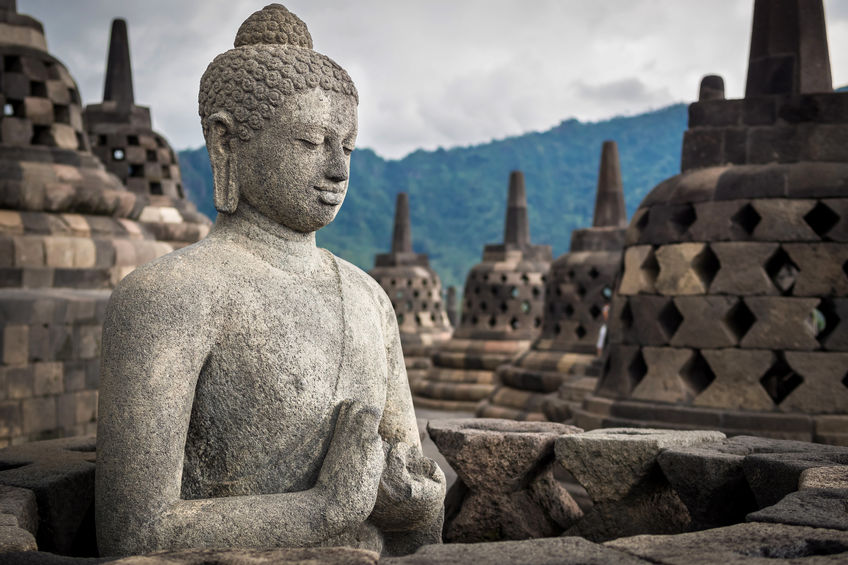Buddhism and cognitive-behavioral therapy (CBT) are very different ways of understanding people. They were developed thousands of years apart, in different hemispheres. Yet they don’t conflict as much as you would think.
“In the words of the Buddha, … ’We are what we think. All that we are arises with our thoughts. With our thoughts we make the world.’ It’s an idea that’s in line with current thinking in psychology. In fact, this simple philosophy – that changing the way we think can change the way we feel – underpins the practice of cognitive behavior therapy (CBT), an approach widely used in clinical psychology and counseling, as well as stress management programs.” So writes Kathy Graham, in a thoughtful article on Buddhism and happiness.

What Is Reality, Anyway?
The radical and powerful notion that our thoughts make up our realities may seem silly at first. It certainly doesn’t seem to stand up when we think of how important circumstances can be in our lives. Even the word “reality” itself is often used in such a way as to connote external circumstances. For example, the phrases “back to reality,” “harsh reality,” or “the real world” usually refer to external circumstances — not our own thoughts.
For example, someone might describe their “reality” as including facts like the following: they are a single mother, 42 years old, working as a project manager at a big company, and making mortgage payments on a condominium. But are these facts enough to explain our whole experience?
This question deserves some thought; on one hand, this is how we usually define our “reality.” On the other, it’s easy to imagine two people in the same circumstances having quite different experiences. One person might be more optimistic and cheerful. They may tend to enjoy each day, whereas someone else might be more pessimistic and anxious, and enjoy life less.
Personality’s Impact
But what is it that makes one person anxious and other person optimistic? We each have our tendencies toward different thought patterns. We can call these tendencies by various names: personality traits, temperaments, reactions to formative experiences, genetic predispositions, or what have you. However we understand these tendencies, their moment-by-moment impact on us happens via our thoughts.
CBT’s Theoretical Basis
One of the most important aspects of CBT is the idea that we can change the content of our thoughts. This, theoretically, can impact how we feel. This is called the “cognitive model.” Many of us have tried to change the way we think about something, with varying degrees of success. For example, take someone who is trying to resist temptation to reunite with their ex-partner. He or she resolves to think only of the person’s bad qualities in order to convince themselves that their ex is a horrible person.
This is not the focus of CBT, of course. In CBT the therapist focuses on helping you understand how certain thought patterns are
- contributing to making you more depressed or anxious, and
- not necessarily based on sound reasoning.
For example, someone who is depressed may tend to think things like, I can’t do anything right, or No wonder he doesn’t like me, I’m a loser. Someone who tends to be anxious, on the other hand, may tend to have thoughts like, This is going to be a disaster or Why hasn’t she called? She must have been in accident.
For whatever reason, we have a tendency to believe these thoughts a bit more than they deserve. Looking at the examples above, it’s not hard to see how the thoughts may be based on insufficient evidence. Although on some level we know this, we have difficulty extricating ourselves from the sadness and anxiety such thoughts bring on. This is where CBT can help.
The Buddhist View of Reality
Let’s return to the quote excerpted in the Kathy Graham article.
We are what we think. All that we are arises with our thoughts. With our thoughts we make the world.
The Dhammapada
The third sentence in this excerpt, ‘with our thoughts we make the world’ seems most consistent with the cognitive model. It indeed represents a point of some agreement between Buddhism and CBT.
At least, the notion that with our thoughts we influence our mood and anxiety is consistent with the cognitive model. But let’s look at what Griffin’s quote is really getting at. The quote is a statement about something deeper than just mood or anxiety, it’s talking about reality. The idea that “we are what we think” may sound like a cute maxim suitable for bumper stickers. However, it refers to an important Buddhist principle — the notion of anatman.

Anatman: – “No self”
Anatman is the concept that at the core of our beings, there is no individual self. Rather, what we mistakenly identify with as our “self” is actually a combination of a physical body, sensations, emotions, and bundles of thoughts. The Buddha would suggest that if any of us closely inspect this “self” through meditation, we would realize that it has no inherent nature or existence; that it is an illusion, basically.
CBT and the Self
CBT focuses not only on thoughts that contribute to depression and anxiety, but also on beliefs that serve the same function. The difference between thoughts and beliefs is that thoughts are discrete events lasting only for a moment, whereas beliefs are more stable and long-lasting. Beliefs can range from the specific, e.g., “I’m no good at bowling, I’ve never been any good at bowling” to the global, e.g., “I’m unlikeable,” or “I am really good at everything.” We all have lots of beliefs like these, covering the full range from the specific to the global. These beliefs span wide ranges of accuracy, helpfulness, and healthiness. CBT considers these beliefs to be relevant, sometimes, to why we experience depression, anxiety, or other problems. From the perspective of Buddhist psychology, these beliefs begin to comprise what we think of as the self.
Consider the example of a 68-year-old man, recently retired from a successful business career in New York. Several months after retirement, he began to become depressed and tried to re-enter the business world. His involvement was not as welcomed as he had hoped, and he became depressed as he realized he would not be able to resume his career. Eventually he sought treatment for depression. This man identified with his career to such an extent that once it was over, he was unsure how to think of himself.
Two Different Takes: Buddhism and CBT
A cognitive therapist might contend that he could no longer rest on his beliefs about himself as an effective businessman, and depression followed. Buddhist philosophy might suggest that the man had relied on an illusory conception of himself; the illusion was that of stability and permanence. This leads us to the phrase quoted from the Buddha, that “all that we are arises with our thoughts.”
Anicca: The Buddhist concept of flux
We all have a tendency to want to believe that something about ourselves is permanent. One of the fundamental concepts of Buddhism is anicca (flux, or impermanence). This is the idea that everything that comes into existence will eventually cease to exist. This applies to everything from the Roman Empire to a blade of grass. It applies to people too; for the retiree mentioned above, he relied on an identity heavily. He did so in such a way that he didn’t really think this version of himself would end. When it did, the effect was similar to a rug being pulled out from under him.
When considering the Buddha’s quote, “all that we are arises with our thoughts,” we need to remember the importance of anicca. According to Buddhism, there is nothing permanent in what we regard as the self. Just as all things are subject to continual change, each of us is constantly changing. So if we pin our identity on one aspect of our lives, like the retired businessman did, eventually we will be a bit of a crisis. In saying that we are nothing more than our thoughts, the Buddha is saying that not only is there nothing solid in our existence, but that what we think of as ourselves is generated by our own minds.
While this philosophy is clearly a further-reaching model than that described by cognitive-behavioral therapy, we can see that the Buddhism and CBT are more consistent with one another than one might think.
